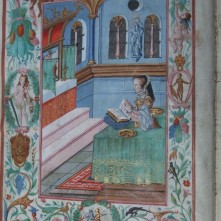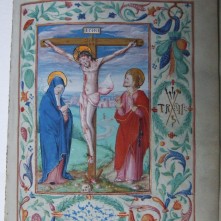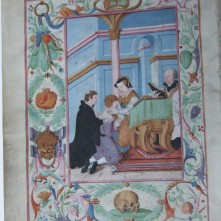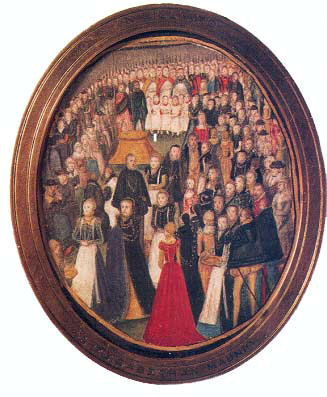Today is Good Friday, the day that commemorates the crucifixion of Jesus Christ, so I'd like to share the Claire Chats video I made last year on how Good Friday was marked in Tudor times. I'm also reposting the information I shared with it.
Thank you to Melanie V. Taylor, our resident art historian, for sharing these photos she took of Mary I's beautiful Crampe Ring Manuscript which is held in the Muniment Room at Westminster Abbey. Melanie explains that "The manuscript sets out the service for the Sovereign's laying on of hands in order to cure the King's evil" and was commissioned by Mary.
- Mary praying for divine guidance
- Mary I touching for the King’s Evil
Mary I, 4 April 1556, Good Friday
CSP, Venice vi. 473, Marco Antonio Faitta to Ippolito Chizzola Doctor in Divinity:
“After this, on Friday morning [4th April] the offertory was performed according to custom in the church of the Franciscan Friars, which is contiguous to the palace. After the Passion the Queen came down from her oratory for the adoration of the cross, accompanied by my lord the right reverend Legate, and kneeling at a short distance from the cross moved towards it on her knees, praying before it thrice, and then she drew nigh and kissed it, performing this act with such devotion as greatly to edify all those who were present. Her Majesty next gave her benediction to the rings, the mode of doing so being as follows: An inclosure (un riparo) was formed for her Majesty to the right of the high altar by means of four benches placed so as to form a square, into the centre of which she again came down from her oratory, and placing herself on her knees within this inclosure, two large covered basins were brought to her, filled with rings of gold and silver, one of these basins containing rings of her own, whilst the other held those of private individuals (particolari), labelled with their owners' names. On their being uncovered she commenced reciting a certain prayer and psalms, and then taking them in her two hands (pigliandoli a mano per mano), she passed them again and again from one hand to the other, saying another prayer, which commenced thus:—
“Sanctifica, Domine, annulos istos.”
This being terminated, her Majesty went to bless the scrofulous, but she chose to perform this act privately in a gallery, where there were not above 20 persons; and an altar being raised there she knelt and recited the confession, on the conclusion of which her Majesty turned towards my right reverend Lord the Legate, who gave her absolution; whereupon a priest read from the Gospel according to St. Mark, and on his coming to the words—
“Super æegros manus imponet et bene habebunt,”
she caused one of those infirm women to be brought to her, and kneeling the whole time she commenced pressing, with her hands in the form of a cross, on the spot where the sore was, with such compassion and devotion as to be a marvel, and whilst she continued doing this to a man and to three women, the priest kept ever repeating these words:
“Super æegros manus imponet, et bene habebunt.”
Then on terminating the Gospel, after the words—
“In principio erat verbum,”
and on coming to the following, namely,—
“Erat lux vera quæ illuminat omnem hominem in hunc mundum,”
then the Queen made the sick people again approach her, and taking a golden coin called an angel, she touched the place where the evil showed itself, and signed it with this coin in the form of the cross; and having done this, she passed a ribbon through a hole which had been pierced in the coin, and placed one of these round the neck of each of the patients, making them promise never to part with that coin, which was hallowed, save in case of extreme need; and then, having washed her hands, the towel being presented to her by my Lord the right reverend the Legate, she returned to her oratory.
Having been present myself in person at all these ceremonies, her Majesty struck me as affording a great and rare example of goodness, performing all those acts with such humility and love of religion, offering up her prayers to God with so great devotion and affection, and enduring for so long a while and so patiently so much fatigue; and seeing thus, that the more her Majesty advances in the rule of this kingdom, so does she daily afford fresh and greater opportunities for commending her extreme piety, I dare assert that there never was a queen in Christendom of greater goodness than this one, whom I pray God long to save and prosper, for the glory of His divine honour, and for the edification and exaltation of His holy church, not less than for the consolation and salvation of the people of this island."






Leave a Reply